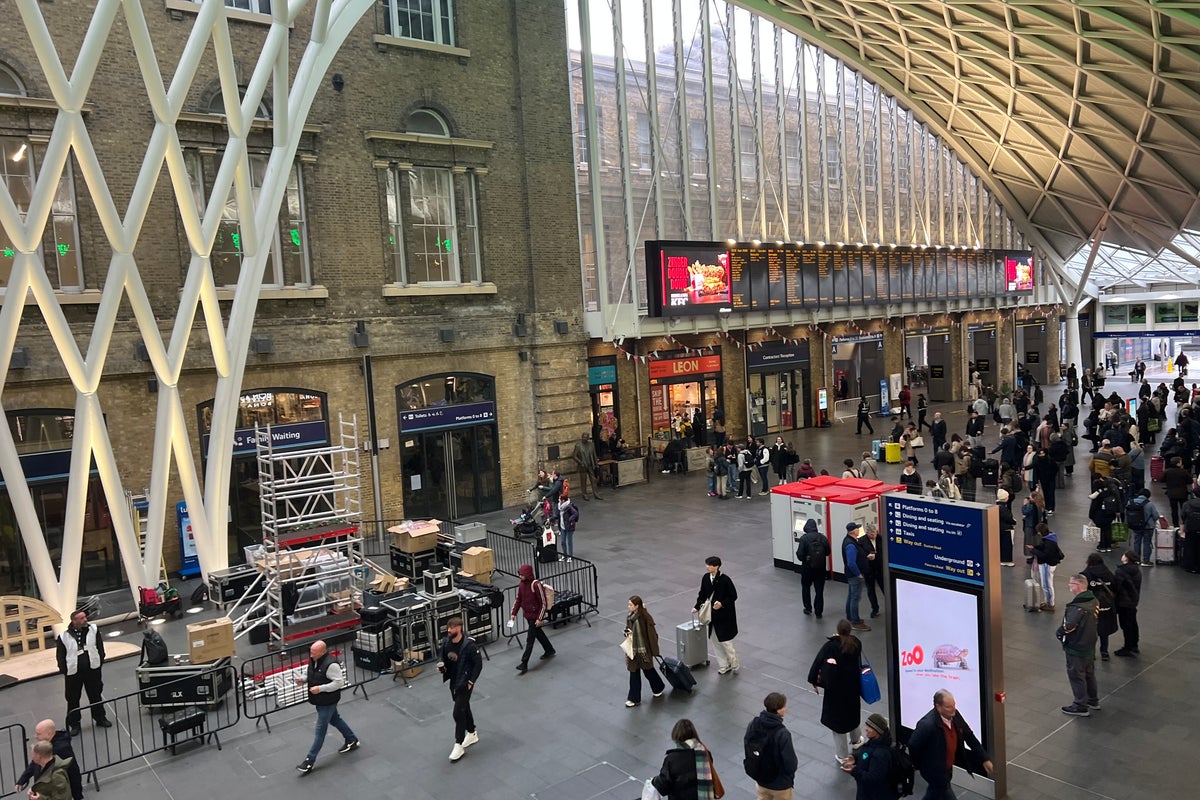Passengers expecting to travel on East Coast Mainline services have been advised the defer their trips if possible as disruption after Saturday evening’s mass stabbing onboard a train from Doncaster to London is expected to continue for several hours.
British Transport Police (BTP) have confirmed that two people remain in a life-threatening condition following the bloody rampage, while two British nationals have been arrested on suspicion of attempted murder.
LNER, which operates East Coast Mainline services in the UK, said disruption to its services between London Kings Cross and Lincoln, Doncaster, Leeds, Bradford Forster Square and Harrogate is likely to last until Monday.
What do we know about the train involved? What measures are in place for passenger safety? And what is the impact on train services today?
Simon Calder is at London King’s Cross station – the intended destination for the train.
What service was involved?
The train involved in the 1 November incident was the 6.25pm LNER departure from Doncaster in South Yorkshire to London King’s Cross. It left on time and called at Retford, Newark, Grantham and Peterborough.
The service departed from Peterborough on time at 7.30pm. One more call was expected 28 minutes later at Stevenage, with arrival in the capital scheduled for 8.23pm.
The train was planned to travel through Huntingdon at 125mph on a fast track that does not have access to a platform.
While the attack was happening, the LNER train driver, their control room and Network Rail signallers were able to divert the train to the slow line and bring it to a halt at the first available station within 14 minutes of departure from Peterborough, with armed police attending.
This was an extraordinarily swift response. The outcome could have been far worse, had the train either stopped short of the station – with access and escape difficult – or continued to Stevenage, .
What security is in place on trains?
CCTV cameras are standard onboard trains, but of course passengers in a confined space are vulnerable to attackers while travelling at 125mph.
Currently the only pre-boarding check for passengers happens at London St Pancras International, with all Eurostar passengers and their baggage checked before departure to Paris, Brussels and Amsterdam. This is because the Channel Tunnel is perceived to be a key terrorist target.
For trains within the UK, British Transport Police patrol trains and stations, but the force has fewer than 3,000 officers – on a network with five million journeys a day. The BTP says patrols will be stepped up in the next few days.
Transport secretary Heidi Alexander said passengers would see “a high visibility presence” of police at railway stations and on trains on Sunday “to reassure the public”.
She added: “My thoughts are with those who have been impacted by the shocking incident in Huntingdon last night, especially those still in hospital today.
“I’d like to pay enormous tribute to the staff and officers who responded, and the public for their patience and cooperation.
“Trains are now running in the area, however Huntingdon station remains closed with trains passing through.
“Passengers will see a high visibility presence of officers at stations and on trains throughout today who are there to reassure the public.”
Rail firms will consider increasing the number of security staff on trains. There are likely to be calls for airport-style security checks before boarding trains. But given the sheer number of travellers and the constraints at stations, that seems impractical.
What is the effect on travel today?
At London King’s Cross, trains now running north to Peterborough and beyond – though with delays and cancellations.
As police continue to work at the crime scene at Huntingdon station, trains have begin to run again through the affected area on the East Coast Main Line.
The section of line between Hitchin and Peterborough, which goes through Huntingdon, has reopened – though with restrictions as one of the tracks is closed.
The route normally connects London King’s Cross with Yorkshire, northeast England and Scotland, but planned engineering work in the York area means no trains are running beyond Doncaster.
National Rail says: “The emergency services are continuing to deal with a major incident between Hitchin and Peterborough. Whilst they carry out their work some lines are still closed.
“Services between London Kings Cross and Peterborough may be cancelled, revised or delayed. Disruption is expected until the end of the day.”
LNER says: “Customers can defer their travel up to and including Tuesday 4 November.”
David Horne, managing director of LNER, said “We are deeply shocked and saddened by this serious incident, and our thoughts are very much with everyone involved.
“I would like to thank the emergency services for their quick and professional response and the care they have provided to those injured. Anyone with information who hasn’t already spoken to police is urged to contact British Transport Police.
“The safety and wellbeing of everyone affected will remain our priority. We will continue to do everything we can to support our customers and colleagues during this difficult time.”
Are train drivers taught to deal with situations like this?
Train drivers are highly trained to handle all manner of unusual circumstances and emergency scenarios. Everything is rooted in safety, and getting passengers to the safest possible location as swiftly as possible is paramount.
On this occasion the driver, along with LNER crew and control room staff, as well as Network Rail, responded with great skill and professionalism.

